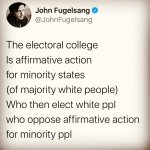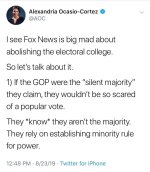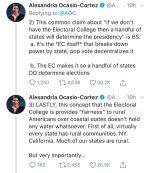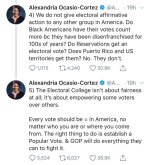lpetrich
Contributor
What is it? Not an educational institution, but a gathering, the original meaning of "college". In present-day terms, it ought to be called the Electoral Assembly.
It is a form of indirect election, and Electoral college and
Electoral college and  Elective monarchy discuss several such electoral assemblies. In democracies, they are almost always composed of elected officials, like legislators or lower-level elected ones.
Elective monarchy discuss several such electoral assemblies. In democracies, they are almost always composed of elected officials, like legislators or lower-level elected ones.
The United States Electoral College is unusual in not being composed of elected officials. The US Constitution's creators considered various other possible forms, like election by Congress and election by state governors -- forms typical of similar assemblies elsewhere in the world. They considered a popular vote, but communications were so poor that they were concerned that each region would choose its favorites. So they decided on the Electoral College as an alternative: people would vote for electors, who in turn would vote for the President and Vice President.
United States Electoral College is unusual in not being composed of elected officials. The US Constitution's creators considered various other possible forms, like election by Congress and election by state governors -- forms typical of similar assemblies elsewhere in the world. They considered a popular vote, but communications were so poor that they were concerned that each region would choose its favorites. So they decided on the Electoral College as an alternative: people would vote for electors, who in turn would vote for the President and Vice President.
There was another problem with a nationwide popular vote: the South would be rather badly underrepresented. Back then, most states, if not all of them, had property qualifications for voting, but those qualifications were weaker in the North than in the South. It was more-or-less owning a family farm vs. owning a plantation with some slaves. Meaning that northerners could easily outvote southerners. Southern states could have expanded their voting rights, but instead they preferred to get slaves counted for representation purposes. They ended up with a 3/5 compromise with the North.
The Avalon Project : Federalist No 68 - Alexander Hamilton proposed that electors would have a broader knowledge of who might be a good President than ordinary people, and voting separately would make life more difficult for demagogues and foreign meddlers.
But that was not to be. The Founders did not take political parties into account, and those who had any opinion of them disliked them as leading to factional squabbling. But the politicians started dividing themselves into parties in George Washington's first term. Alexander Hamilton's notion of the EC as some search committee quickly evaporated, and the electors soon became chosen by the parties, endorsing whichever candidates the parties had chosen.
It is a form of indirect election, and
The
There was another problem with a nationwide popular vote: the South would be rather badly underrepresented. Back then, most states, if not all of them, had property qualifications for voting, but those qualifications were weaker in the North than in the South. It was more-or-less owning a family farm vs. owning a plantation with some slaves. Meaning that northerners could easily outvote southerners. Southern states could have expanded their voting rights, but instead they preferred to get slaves counted for representation purposes. They ended up with a 3/5 compromise with the North.
The Avalon Project : Federalist No 68 - Alexander Hamilton proposed that electors would have a broader knowledge of who might be a good President than ordinary people, and voting separately would make life more difficult for demagogues and foreign meddlers.
But that was not to be. The Founders did not take political parties into account, and those who had any opinion of them disliked them as leading to factional squabbling. But the politicians started dividing themselves into parties in George Washington's first term. Alexander Hamilton's notion of the EC as some search committee quickly evaporated, and the electors soon became chosen by the parties, endorsing whichever candidates the parties had chosen.





